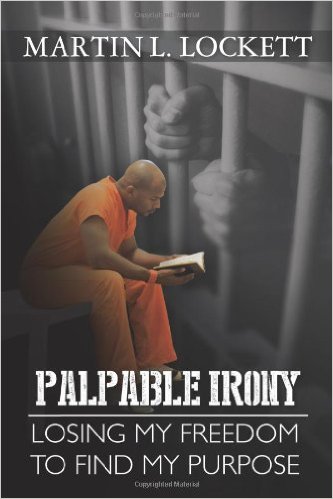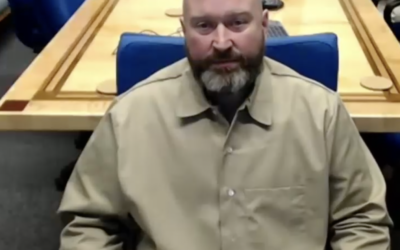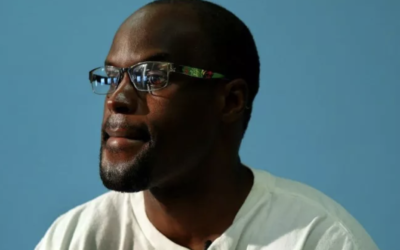
We introduced you to our friend Martin Lockett in a previous blog post. We are thrilled to say that Martin will be a regular contributor both here and in our quarterly newsletter. Do yourself a favor and get this book!
—♦—
Good people make mistakes. Martin Lockett is a good person who made an error in judgement which resulted in the deaths of two people. But for one red light, Martin might have escaped fate. After reading his memoir it is apparent that Lockett truly regrets the loss of life he caused but embraces his fate and his punishment without regret.
In Palpable Irony: Losing My Freedom to Find my Purpose, Lockett describes his journey from a shy, awkward young boy to a young man who falls in with some pretty rough characters just at that pivotal time when he’s coming into his own as an individual. The narrative – not only is it brutally honest, but also very well-written – makes one realize just how thin is that line between social failure and success.
For instance, during his high school years, Martin engages in criminal behavior that isn’t out of necessity – he holds down a job – but about ‘thrills’ and peer pressure.
Growing up, he lives in the ghetto but in an atypical setting from what we’re accustomed in many stories about young black males: his father is present and playing an active role in his life, he’s a good kid at heart but ambivalent about his own place and ethnic identity. “I wish I was white,” he thinks to himself. And yet, it is the black stereotype that he emulates because those who model it for him seem confident and successful.
Martin’s own good nature ends up betraying him. He’s given a five year prison sentence for a robbery he planned but did not participate in. He incriminates himself while talking to police about some unrelated (to that robbery) incidents. Deep down, it could be argued, he wanted to get caught.
In further testament to his innately good character, Lockett earns eligibility to complete Oregon’s Boot Camp program, and flies through with top honors. He leaves prison after 38 months, abstains from any criminal behavior, holds down a job and is offered opportunities for promotion based on his exceptional work ethic. Unfortunately he really isn’t aware at the time that he’s developed a drinking problem. The two people killed when he ran a red light on New Year’s 2004 were MADD members traveling home from an alcohol-free party. Irony indeed.
Though his criminal past is completely behind him and is unrelated to the accident, it’s counted against him. His sincere horror at what he’s done leads him to cooperate with police. Adding to the palpable irony, it is this cooperation which torpedoes the only chance he might be treated with mercy. He’s ultimately given a 17 ½ year sentence.
Even before he was sentenced, Martin had decided to dedicate his life to carrying the torch formerly carried by his victims. His inherent goodness, and some in this day and age would label it naivete, has reaped benefits and penalties. Some of us under similar circumstances might despair and give up good will all together. Not Martin Lockett. Since entering prison he’s earned a Bachelor’s degree in Sociology from Colorado State University, Pueblo, and is on his way to receive his Master’s degree. This, not on the state’s dime.
Lockett shows us that good people struggle and learn from their mistakes. Though he doesn’t complain, it’s clear that he’s a victim himself of society’s current lack of mercy. We want to lock everyone up and throw away the key. Society has actually robbed itself of someone ready, willing, and educated sufficiently to make a positive difference in the lives of others. What benefit is incurred if he is kept in prison another seven years?
This book is an excellent first step to educate young men of all ethnic backgrounds that it’s easy for good people to fall astray. More than that it is an inspiring example of courage, perseverance, and integrity. It should be on every high school reading list and on MADD’s recommended list as well, if they have one.
For those who would want Martin forever shamed, and are offended at anyone who would hold him up as a good person, I would urge you to reconsider. Please read the book and consider that many formerly incarcerated persons have gone on to live productive lives. Some have even been adored – Merle Haggard, Wesley Snipes and Martha Stewart, to name a few.





I like your blog. There are many good resources here. I’m going to add a link to you on my blog. I understand why the last line was written. There are people who have negative things to say but have no clue what they are talking about, but they want them to have the harshest sentence possible, as if they never did anything in the slightest that broke a law. My purpose in life is to do what I can to help correct that thinking and help make changes.
I did get the book and read it to the end. It is so ironic. I am writing a book right now and the similarities are bizarre. They are both black men about one year apart in age. Both got 17 year sentences, and by the end of the book both were at the ten year mark. Both want to work with kids when they get out. One huge difference is that Jamie (of my blog) is at a maximum security prison in ad seg. He has had a much rougher time than Martin. He has suffered through everything wrong with our prison system. Jamie doesn’t have an adult arrest record and was never in prison, but his public defender had no intention of helping him. I am also the grandmother of his only son who was born after he went in. My daughter won’t take his son to see him and his family ignores him. I am Jamie’s only support, and through these years it became obvious his story needed to be written. Martin turned to Christianity, Jamie to Buddhism. I wish Martin the best of luck.
On the technical side of the book – it is very poorly edited. Whoever did the copy editing doesn’t understand simple editing and sentence structure. It got better toward the end almost as though two different people edited the book. I did want to read his story and I would recommend anyone to read it.
Thanks for the comments.
What an amazing and inspiring thing you’re doing for Jamie, the world needs more of that.
thank you